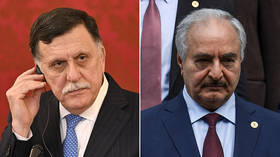Libyan UN-backed PM says he will respect Berlin summit's call for ceasefire, but won't sit down again with Haftar

The head of the UN-backed Government of National Accord, Fayez al-Sarraj has said he would stick to the truce supported at the Berlin peace conference but would still not engage in direct talks with General Khalifa Haftar.
The prime minister of the Tripoli-based government rejected any possibility of direct talks with his major rival in the years-long Libyan civil war, whose forces control most of the war-ravaged country’s territory but are still unable to capture several major population centers, including Tripoli.
“For me it’s clear… We will not sit down again with the other side,” Serraj told Reuters in Berlin.
The two sides joined a ceasefire last week upon the initiative of Russia and Turkey, but after it came into force, militias loyal to Haftar blocked Libya’s eastern oil terminals, bringing the nation’s oil exports to a halt.
Also on rt.com Libyan National Oil Corporation declares ‘state of emergency’ after Haftar’s forces close eastern oil portsFollowing the blockade, Libya’s National Oil Corporation declared a state of emergency. Sarraj has now warned that the nation will face a “catastrophic situation” if the blockade is not lifted, and called on the international community to exert influence on Haftar to make that happen.
At the same time, he rejected Haftar’s demands for redistribution of oil revenues between various political forces in Libya. A document adopted at the Berlin peace conference attended by the two rival Libyan leaders says, among other things, that all Libyan ethnic, sectarian and political group should have access to the nation’s natural resources.
Sarraj said he’s rejecting Haftar’s condition of profit sharing for the lifting of port blockades.
Also on rt.com ‘Arms embargo & commitment to ceasefire’: Libya peace talks end on positive note in Berlin despite enduring disagreementsFollowing the talks, which lasted for around five hours on Sunday and were also attended by the leaders of Russia, Turkey, France, Germany, the UK, and Italy, as well as the US secretary of state, Sarraj and Haftar agreed to send five representatives each to a military committee under UN auspices to maintain the ceasefire and resolve any issues arising associated with it. However, according to German Chancellor Angela Merkel, Sarraj and Haftar did not meet each other in Berlin.
If you like this story, share it with a friend!












